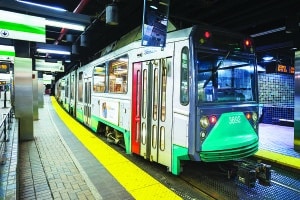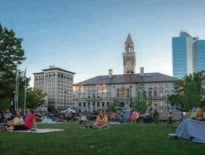Travel on the MBTA’s subway and commuter rail network will cost more starting July 1 after the authority’s oversight board approved a fare-hike plan Monday, securing tens of millions of dollars more in revenue every year that leaders say is necessary to continue service improvements and close a budget gap.
The final version of the increases approved Monday average about 5.8 percent, but vary by travel type, and the board ultimately agreed to back off earlier proposed increases in bus fares. Under amendments made to the plan during Monday’s meeting, all bus rates as well as various reduced-cost passes will remain level, and the MBTA cannot implement additional fare hikes for another three years, other than changes to accommodate a new automated collection system.
A single ride on the subway will now cost $2.40, up from $2.25, while a monthly bus and subway LinkPass rise from $84.50 to $90. The largest increase by dollars will be on the commuter rail, where monthly passes for the most distant zones will jump by up to $27.75. The new measures will generate $29 million in new revenue.
The board voted 4-0 to approve the increases. Monica Tibbits-Nutt abstained from the final vote, calling the move “premature” due to a lack of specific information about how the new revenue will fund short-term improvements. She had earlier proposed the amendment to block additional hikes for the next three years rather than the two years currently required by law.
“We keep talking about improving service, and we’re just not doing it,” Tibbits-Nutt said. “Riders and the public have a right to see things actually improving … I’m trying to buy staff time to justify another fare increase, and I think they need three years at best.”
The vote drew quick criticism from several public figures who had spoken out against the proposal. Boston City Councilor Michelle Wu, who submitted a petition to the board with 3,200 signatures opposing the hikes, said in a statement that the protections for bus rates and discounted passes were encouraging but that the overall vote was “disappointing and frustrating.”
Leaders argue the fare hikes, although unpopular among the public, are necessary to fund investments in service quality. Projections indicate the MBTA’s deficit would grow in fiscal year 2020 – when leaders have proposed a $2.1 billion budget – if not for a combination of increased fares and cost-cutting measures.
“We heard frustrations over fares, but what we really heard was frustration over service. The only way we can make the service better is to have the resources to invest in the T,” Transportation Secretary Stephanie Pollack said.
Joseph Aiello, the board’s chairman, said he wants the FMCB to get more involved in policy discussions on Beacon Hill and asked for a briefing at upcoming meetings on various legislative proposals to increase transportation revenue.
“There’s certainly great interest in that,” he said. “Over the next three weeks, we’re going to attempt to have a consensus on that.”
“I think at some point, we have to move beyond talking about gas tax, congestion pricing, [ride-hailing apps],” Tibbits-Nutt said. “We haven’t had the mechanism to do that. We need to find the mechanism to do that because we are running out of time to find different revenue streams and also running out of time to take the climate-change issue seriously.”




 |
| 


